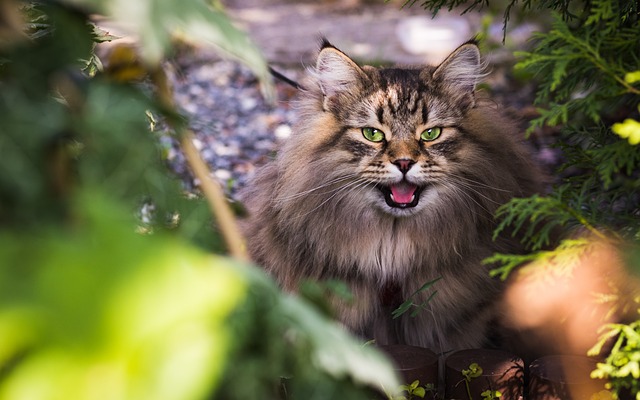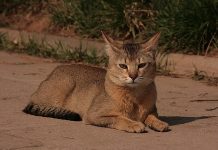History and Origins of the Siberian Cat Breed

The Siberian cat is a natural breed believed to have originated in Russia, specifically the Siberian region, where it developed in the harsh climate of the Russian forests. This breed has a long history dating back hundreds of years, and it is considered one of the oldest domesticated cat breeds. The Siberian cat’s origins are intertwined with Russian folklore and history.
- Ancient Roots: Siberian cats are believed to have been kept by the Russian peasants and farmers for centuries, primarily for their exceptional hunting skills and ability to thrive in cold climates.
- Russian Folklore: Siberian cats are often featured in Russian folklore and fairy tales, where they are depicted as mystical and wise creatures that bring good luck to their owners.
- Natural Adaptation: The Siberian cat’s thick, triple-layered fur and robust physique are a result of natural adaptation to the harsh climate of Siberia, where temperatures can drop significantly during the winter months.
- Recognition and Preservation: The Siberian cat breed gained formal recognition in the mid-20th century in Russia. Efforts were made to preserve and protect the breed’s unique characteristics and genetic diversity.
- Export to the West: In the late 20th century, Siberian cats were exported to Western countries, where they gained popularity as companion animals due to their friendly nature, striking appearance, and hypoallergenic qualities.
Physical Characteristics and Appearance of Siberian Cats
Siberian cats are known for their distinctive appearance and robust physique. Here are key physical characteristics and traits of Siberian cats:
- Size: Siberian cats are large and muscular, with males typically being larger than females. Adult males can weigh between 15-20 pounds, while females usually range from 10-15 pounds.
- Coat: Siberian cats have a dense, triple-layered coat that insulates them from cold weather. The coat is water-resistant and can come in various colors and patterns, including tabby, solid, tortoiseshell, and colorpoint.
- Fur: The Siberian’s fur is medium to long in length, with a full ruff around the neck (more prominent in males) and britches on the hind legs. The tail is bushy and well-furred.
- Hypoallergenic Qualities: Siberian cats are often considered hypoallergenic due to their lower levels of the Fel d 1 protein, which is a common allergen in cat saliva and dander.
- Head and Face: Siberian cats have a broad, modified wedge-shaped head with rounded contours. The ears are medium to large, slightly rounded, and well-furred.
- Eyes: Siberian cats have large, expressive eyes that are usually round or slightly oval in shape. Eye colors can vary and include gold, green, or blue.
- Body: Siberian cats have a sturdy and muscular body with a broad chest and powerful legs. They are agile and athletic cats, known for their strength and endurance.
- Personality: Siberian cats are known for their friendly and sociable nature. They are intelligent, playful, and affectionate, forming strong bonds with their human families.
Siberian cats are prized for their beauty, gentle temperament, and adaptability. They make excellent companions for families and individuals alike, especially those looking for a cat that thrives in colder climates and enjoys interactive play and affectionate companionship.
Siberian Cat Temperament and Personality Traits
Siberian cats are known for their friendly and affectionate temperament. They have a charming personality that makes them great companions for families and individuals alike. Here are key temperament and personality traits of Siberian cats:
- Friendly and Sociable: Siberian cats are highly social and enjoy interacting with people. They are known for their friendly demeanor and often seek out companionship from their human family members.
- Intelligent and Curious: Siberian cats are intelligent and curious by nature. They enjoy exploring their surroundings and engaging in interactive play. They are quick learners and can be taught tricks and commands.
- Playful and Energetic: Siberian cats have a playful and energetic disposition, even into adulthood. They enjoy interactive toys, puzzle games, and activities that stimulate their mind and body.
- Affectionate and Loving: Siberian cats are affectionate and form strong bonds with their owners. They often enjoy cuddling and will seek out attention and affection from their family members.
- Gentle and Patient: Siberian cats are known for their gentle nature, making them well-suited for households with children and other pets. They are patient and tolerant, making them excellent companions for families.
- Adaptable: Despite their origins in cold climates, Siberian cats are adaptable to different environments. They can thrive in various living situations, including apartments or homes with outdoor access.
- Vocal: Siberian cats are moderately vocal and may communicate with soft chirps, trills, or meows to express their needs or desires. They enjoy “talking” with their owners and engaging in conversation.
- Independent: While they enjoy human companionship, Siberian cats also have an independent streak. They are capable of entertaining themselves and can be left alone for reasonable periods.
- Loyal and Protective: Siberian cats are known to be loyal to their families and may exhibit protective behaviors toward their loved ones.
Care and Grooming Needs for Siberian Cats
Siberian cats have moderate grooming needs due to their semi-longhaired coat. Here are essential care and grooming tips for Siberian cats:
- Regular Brushing: Brush your Siberian cat’s coat at least once or twice a week to prevent mats and tangles. Use a stainless steel comb or a slicker brush to gently remove loose hair and distribute skin oils.
- Bathing: Siberian cats are generally clean cats and may not require frequent baths unless they get exceptionally dirty. Use a cat-specific shampoo and rinse thoroughly to avoid skin irritation.
- Nail Trimming: Trim your cat’s nails every few weeks to prevent them from becoming too long. Use cat-specific nail clippers and be careful not to cut into the quick.
- Ear Cleaning: Check and clean your Siberian cat’s ears regularly to remove wax buildup and reduce the risk of ear infections. Use a vet-approved ear cleaning solution and cotton balls.
- Dental Care: Maintain your cat’s oral health by brushing their teeth regularly with a cat-specific toothbrush and toothpaste. Dental treats or toys can also help promote good dental hygiene.
- Nutrition: Feed your Siberian cat a balanced and high-quality cat food that meets their nutritional needs. Provide fresh water at all times and monitor their food intake to prevent obesity.
- Veterinary Care: Schedule routine veterinary check-ups for your Siberian cat to monitor their health, administer vaccinations, and address any medical concerns promptly.
By providing proper care, attention, and affection, you can ensure that your Siberian cat remains healthy, happy, and cherished as a beloved member of your family. Their loving nature and playful personality make them wonderful companions for cat enthusiasts of all ages.
Health Considerations and Common Issues in Siberian Cats
Siberian cats are generally healthy and hardy cats with a long lifespan, but like all breeds, they may be prone to certain health conditions. It’s important to be aware of potential health considerations and common issues in Siberian cats:
- Hypertrophic Cardiomyopathy (HCM): This is a common heart condition in cats, including Siberian cats. Regular cardiac screenings are recommended to detect and monitor HCM early.
- Feline Allergies: Despite their reputation as hypoallergenic cats, some individuals may still experience allergies to Siberian cats. It’s essential to spend time with a Siberian cat before bringing one home if allergies are a concern.
- Urinary Tract Issues: Siberian cats may be prone to urinary tract issues such as urinary crystals or infections. Providing plenty of fresh water and a balanced diet can help support urinary health.
- Obesity: Like any cat, Siberian cats can become overweight if overfed or not provided with enough exercise. Monitor their food intake and encourage regular play and activity to prevent obesity-related health problems.
- Dental Problems: Siberian cats may develop dental issues such as periodontal disease or gingivitis. Regular dental care, including tooth brushing and professional cleanings, is important for maintaining oral health.
- Genetic Disorders: While Siberian cats are generally healthy, some genetic disorders may occur. Responsible breeding practices can help minimize the risk of hereditary conditions.
- Hairballs: Due to their semi-longhaired coat, Siberian cats may be more prone to hairballs. Regular grooming and providing hairball remedies can help reduce the risk.
- Respiratory Issues: Some Siberian cats may experience respiratory problems, especially if they have a brachycephalic (short-nosed) structure. Avoid exposure to smoke, dust, or other respiratory irritants.
Living with a Siberian Cat: Suitable Environments and Lifestyle Considerations

Siberian cats are adaptable and can thrive in various environments, but there are specific considerations to ensure they lead a happy and healthy life:
- Indoor Living: Siberian cats can adapt well to indoor living but may also enjoy access to a secure outdoor enclosure or supervised outdoor time. Ensure your home is cat-proofed and safe.
- Interactive Play: Siberian cats are active and playful cats. Provide interactive toys, climbing structures, and regular play sessions to keep them mentally and physically stimulated.
- Affection and Companionship: Siberian cats are social and thrive on companionship. Spend quality time with your cat, engage in interactive play, and provide plenty of affection and attention.
- Nutrition: Feed your Siberian cat a balanced and high-quality diet suitable for their age and activity level. Avoid overfeeding and monitor their weight to prevent obesity.
- Regular Veterinary Care: Schedule routine veterinary check-ups for your Siberian cat to monitor their health and address any medical concerns promptly. Keep up with vaccinations and preventative care.
- Grooming Routine: Establish a regular grooming routine to keep your Siberian cat’s coat in good condition and reduce shedding. Brush their coat regularly and trim their nails as needed.
- Quiet Environment: Siberian cats appreciate a calm and quiet environment where they can rest undisturbed. Provide cozy resting areas and minimize loud noises or disruptions.
By providing a loving home environment, proper care, and regular veterinary attention, you can ensure that your Siberian cat lives a happy, healthy, and fulfilling life as a cherished member of your family. Their friendly nature and playful personality make them wonderful companions for cat lovers of all ages.
Siberian Cat Variations and Breeding Practices
The Siberian cat breed is known for its natural variation in coat colors and patterns, although the breed standard primarily recognizes specific colors and combinations. Here’s an overview of Siberian cat variations and breeding practices:
Coat Colors and Patterns
Siberian cats can exhibit a range of coat colors and patterns, although certain colors are more common and recognized within the breed standard:
- Solid Colors:
- Black
- Blue
- White
- Red
- Cream
- Tabby Patterns:
- Classic (marbled or blotched)
- Mackerel (striped)
- Spotted
- Ticked (agouti)
- Colorpoint (Siamese-like) Patterns:
- Seal point
- Blue point
- Chocolate point
- Lilac point
- Tortoiseshell and Calico:
- Tortoiseshell (combination of two or more colors, typically black and red)
- Calico (white with patches of two or more colors)
Breeding Practices
Responsible Siberian cat breeders adhere to established breed standards and prioritize the health, temperament, and genetic diversity of their cats. Here are key breeding practices for Siberian cats:
- Health Screening: Before breeding, reputable breeders conduct health screenings to test for genetic disorders and common health issues like hypertrophic cardiomyopathy (HCM) and kidney disease. Breeding cats should be certified free of hereditary diseases.
- Pedigree Analysis: Breeders carefully select breeding pairs based on pedigree analysis, considering lineage, conformation, coat color, and temperament. The goal is to maintain and enhance desirable traits while minimizing potential genetic issues.
- Genetic Diversity: To preserve genetic diversity and reduce the risk of inbreeding, breeders may introduce new bloodlines into their breeding programs. Outcrossing with other breeds may also be considered under careful supervision.
- Temperament Testing: Siberian cats are known for their friendly and sociable nature. Breeders evaluate kittens’ temperaments to ensure they exhibit typical Siberian traits, such as affection, playfulness, and adaptability.
- Ethical Practices: Responsible breeders prioritize the well-being of their cats and adhere to ethical breeding practices. They provide proper veterinary care, nutrition, socialization, and enrichment to ensure healthy, well-adjusted kittens.
- Breeding Goals: Breeders aim to produce kittens that conform to breed standards while maintaining excellent health, temperament, and overall quality. They participate in cat shows and breed associations to showcase their cats and receive feedback from judges.
- Kitten Placement: Reputable breeders carefully screen potential owners to ensure kittens are placed in loving and suitable homes. They provide support and guidance to new owners and remain available for any questions or concerns.
- Continuous Improvement: Responsible breeders are committed to continuous improvement of the breed. They collaborate with other breeders, participate in breed clubs, and stay informed about new developments in feline genetics and health.
Siberian cats are a diverse and beautiful breed with a range of coat colors and patterns. Responsible breeding practices are essential for maintaining the breed’s health, temperament, and genetic diversity. By following ethical guidelines and prioritizing the well-being of their cats, breeders contribute to the preservation and success of the Siberian cat breed, ensuring that these beloved cats continue to bring joy to families for generations to come.
50 Best Names with Meanings for Siberian Cats
Choosing a meaningful and fitting name for your Siberian cat can be a delightful way to celebrate their unique personality and characteristics. Here’s a list of 50 best names with meanings that may suit your Siberian cat:
- Nikita – Means “unconquered” or “victorious” in Russian.
- Sasha – Short for Alexander or Alexandra, meaning “defender of mankind.”
- Misha – Russian diminutive of Mikhail, meaning “who is like God.”
- Kira – Means “sun” in Russian, reflecting brightness and warmth.
- Anya – Means “grace” or “favor” in Russian.
- Ivan – Traditional Russian name meaning “God is gracious.”
- Luka – Russian form of Luke, meaning “light-giving” or “bringer of light.”
- Lena – Short for Yelena, meaning “bright” or “shining light.”
- Zoya – Means “life” in Russian, symbolizing vitality and energy.
- Dmitri – Russian form of Demetrius, meaning “follower of Demeter” (goddess of agriculture).
- Nadia – Means “hope” in Russian.
- Ruslan – Derived from the name of a legendary hero in Russian folklore.
- Milo – Means “gracious” or “merciful.”
- Katya – Diminutive of Yekaterina (Catherine), meaning “pure.”
- Maxim – Means “greatest” in Russian.
- Tatiana – Means “fairy queen” in Russian.
- Yuri – Russian form of George, meaning “farmer” or “earthworker.”
- Ludmila – Means “dear to the people” in Russian.
- Boris – Means “battle” or “snow leopard” in Russian.
- Vera – Means “faith” or “truth” in Russian.
- Pavel – Russian form of Paul, meaning “small” or “humble.”
- Misha – Means “bear” in Russian, a fitting name for a fluffy Siberian cat.
- Sonya – Diminutive of Sophia, meaning “wisdom.”
- Yuri – Russian form of George, meaning “farmer” or “earthworker.”
- Vasily – Russian form of Basil, meaning “royal” or “kingly.”
- Svetlana – Means “light” or “blessed” in Russian.
- Arkady – Derived from the Greek name Arkadios, meaning “of Arcadia.”
- Lara – Means “cheerful” or “light-hearted.”
- Aleksei – Russian form of Alexis, meaning “defender” or “helper.”
- Marina – Means “of the sea” in Russian.
- Igor – Means “warrior” or “protector.”
- Zara – Means “princess” in Russian.
- Ruslana – Feminine form of Ruslan, meaning “lion of the woods.”
- Anton – Russian form of Anthony, meaning “priceless” or “invaluable.”
- Zephyr – Means “west wind,” symbolizing gentleness and freedom.
- Sofia – Means “wisdom” in Russian.
- Maksim – Russian form of Maximus, meaning “greatest.”
- Alina – Means “bright” or “beautiful” in Russian.
- Yevgeny – Russian form of Eugene, meaning “well-born” or “noble.”
- Nina – Means “dreamer” or “dream” in Russian.
- Rurik – Derived from the name of a legendary founder of the Russian state.
- Kira – Means “ruler” or “leader” in Russian.
- Vladimir – Means “ruler of peace” in Russian.
- Lara – Means “cheerful” or “light-hearted.”
- Natalia – Means “born on Christmas Day” or “birthday.”
- Sergei – Russian form of Sergius, meaning “servant” or “soldier.”
- Yulia – Russian form of Julia, meaning “youthful” or “young.”
- Dmitri – Russian form of Demetrius, meaning “follower of Demeter.”
- Nikolai – Russian form of Nicholas, meaning “victory of the people.”
- Valentina – Means “strong” or “healthy” in Russian.
Choose a name that resonates with your Siberian cat’s personality, appearance, or your own cultural background. Your cat will appreciate the love and attention that comes with their new name!

In conclusion, the Siberian cat is a remarkable breed known for its robust nature, stunning appearance, and friendly demeanor. Originating from Russia, these cats have adapted to harsh climates and are characterized by their thick, triple-layered coat that resists water. Siberians are intelligent, agile, and enjoy exploring their surroundings. They are affectionate and sociable cats that form strong bonds with their families, including children and other pets. Siberian cats are known for their hypoallergenic qualities, making them suitable for allergy sufferers. With their playful yet gentle nature and striking looks, Siberian cats make wonderful companions for those seeking a loving and resilient feline friend.






























